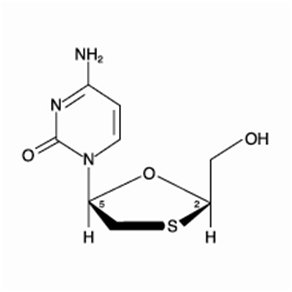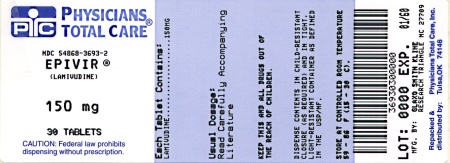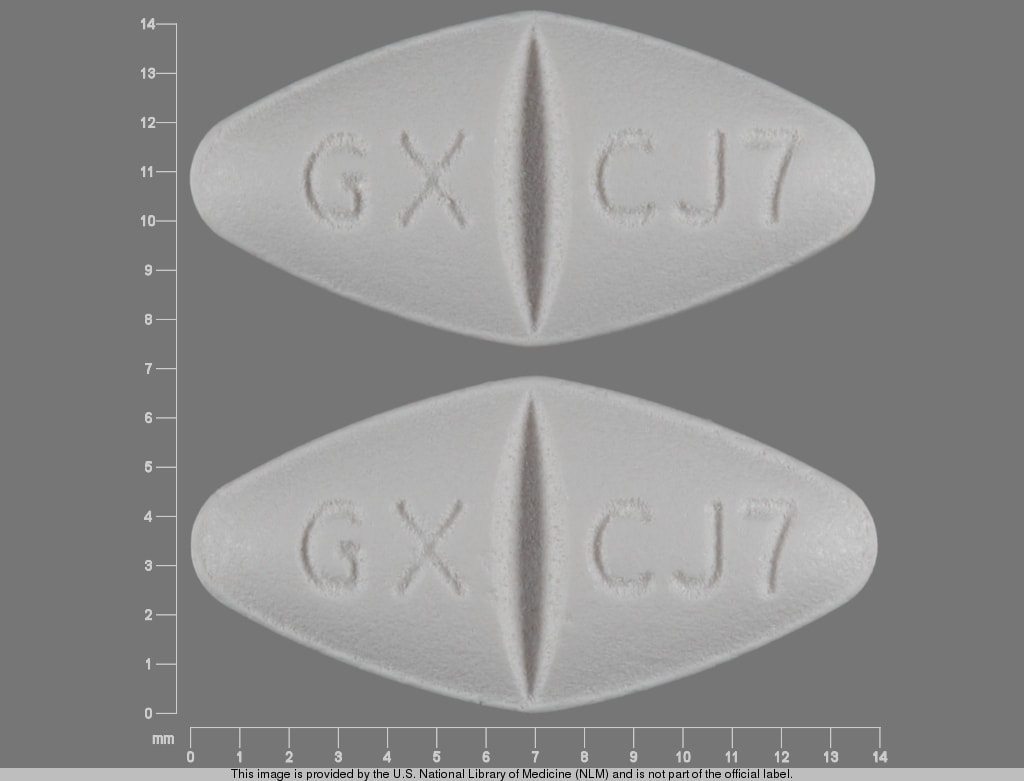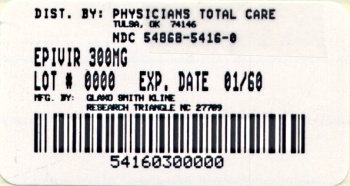Epivir
Generic name: lamivudine
Brand names: Epivir, Epivir HBV
Drug class: Nucleoside reverse transcriptase inhibitors (NRTIs)
Medically reviewed by A Ras MD.
What is Epivir?
Epivir is a prescription medicine used together with other antiretroviral medicines to treat Human Immunodeficiency Virus (HIV-1) infection.
HIV-1 is the virus that causes Acquired Immune Deficiency Syndrome (AIDS).
Epivir tablets and oral solution (used to treat HIV-1 infection) contain a higher dose of the same active ingredient (lamivudine) than is in the medicine EPIVIR-HBV tablets and oral solution (used to treat HBV). If you have both HIV-1 and HBV, you should not use Epivir-HBV to treat your infections.
The safety and effectiveness of Epivir have not been established in children under 3 months of age.
Description
EPIVIR-HBV is a synthetic nucleoside analogue with activity against HBV. The chemical name of lamivudine is (2R,cis)-4-amino-1-(2-hydroxymethyl-1,3-oxathiolan-5-yl)-(1H)-pyrimidin-2-one. Lamivudine is the (-)enantiomer of a dideoxy analogue of cytidine. Lamivudine has also been referred to as (-)2′,3′-dideoxy, 3′-thiacytidine. It has a molecular formula of C8H11N3O3S and a molecular weight of 229.3 g per mol. It has the following structural formula:

Lamivudine is a white to off-white crystalline solid with a solubility of approximately 70 mg per mL in water at 20°C.
EPIVIR-HBV tablets are for oral administration. Each tablet contains 100 mg of lamivudine and the inactive ingredients hypromellose, macrogol 400, magnesium stearate, microcrystalline cellulose, polysorbate 80, red iron oxide, sodium starch glycolate, titanium dioxide, and yellow iron oxide.
EPIVIR-HBV oral solution is for oral administration. One milliliter (1 mL) of EPIVIR-HBV oral solution contains 5 mg of lamivudine (5 mg per mL) in an aqueous solution and the inactive ingredients artificial strawberry and banana flavors, citric acid (anhydrous), methylparaben, propylene glycol, propylparaben, sodium citrate (dihydrate), and sucrose (200 mg).
What is the most important information I should know about Epivir?
Epivir can cause serious side effects, including:
- Worsening of hepatitis B virus in people who have HIV-1 infection. If you have HIV-1 (Human Immunodeficiency Virus type 1) and hepatitis B virus (HBV) infection, your HBV may get worse (flare-up) if you stop taking Epivir. A “flare-up” is when your HBV infection suddenly returns in a worse way than before. Worsening liver disease can be serious and may lead to death.
- Do not run out of Epivir. Refill your prescription or talk to your healthcare provider before your Epivir is all gone.
- Do not stop Epivir without first talking to your healthcare provider.
- If you stop taking Epivir, your healthcare provider will need to check your health often and do blood tests regularly for several months to check your liver.
- Resistant Hepatitis B Virus (HBV). If you have HIV-1 and hepatitis B, the hepatitis B virus can change (mutate) during your treatment with Epivir and become harder to treat (resistant).
Who should not take Epivir?
Do not take Epivir if you are allergic to lamivudine or any of the ingredients in Epivir. See the end of this Patient Information leaflet for a complete list of ingredients in Epivir.
What should I tell my healthcare provider before taking Epivir?
Before you take Epivir, tell your healthcare provider if you:
- have or have had liver problems, including hepatitis B or C virus infection.
- have kidney problems.
- have diabetes. Each 15-mL dose (150 mg) of Epivir oral solution contains 3 grams of sucrose.
- are pregnant or plan to become pregnant. Taking Epivir during pregnancy has not been associated with an increased risk of birth defects. Talk to your healthcare provider if you are pregnant or plan to become pregnant.
- Pregnancy Registry. There is a pregnancy registry for women who take antiretroviral medicines during pregnancy. The purpose of this registry is to collect information about the health of you and your baby. Talk to your healthcare provider about how you can take part in this registry.
- are breastfeeding or plan to breastfeed. Do not breastfeed if you take Epivir.
- You should not breastfeed if you have HIV-1 because of the risk of passing HIV-1 to your baby.
Tell your healthcare provider about all the medicines you take, including prescription and over-the-counter medicines, vitamins, and herbal supplements.
Some medications interact with Epivir. Keep a list of your medicines and show it to your healthcare provider and pharmacist when you get a new medicine. You can ask your healthcare provider or pharmacist for a list of medicines that interact with Epivir.
Do not start taking a new medicine without telling your healthcare provider. Your healthcare provider can tell you if it is safe to take Epivir with other medicines.
How should I take Epivir?
- Take Epivir exactly as your healthcare provider tells you to take it.
- If you miss a dose of Epivir, take it as soon as you remember. Do not take 2 doses at the same time or take more than what your healthcare provider tells you to take.
- Stay under the care of a healthcare provider during treatment with Epivir.
- Epivir may be taken with or without food.
- For children 3 months and older, your healthcare provider will prescribe a dose of Epivir based on your child’s body weight.
- Tell your healthcare provider if you or your child has trouble swallowing tablets. Epivir also comes as a liquid (oral solution).
- Do not run out of Epivir. The virus in your blood may increase and the virus may become harder to treat. When your supply starts to run low, get more from your healthcare provider or pharmacy.
- If you take too much Epivir, call your healthcare provider or go to the nearest hospital emergency room right away.
What are the possible side effects of Epivir?
- Epivir can cause serious side effects including:
- See “What is the most important information I should know about Epivir?”
- Build-up of an acid in your blood (lactic acidosis). Lactic acidosis can happen in some people who take Epivir. Lactic acidosis is a serious medical emergency that can cause death. Call your healthcare provider right away if you get any of the following symptoms that could be signs of lactic acidosis:
- Serious liver problems can happen in people who take Epivir. In some cases, these serious liver problems can lead to death. Your liver may become large (hepatomegaly) and you may develop fat in your liver (steatosis). Call your healthcare provider right away if you get any of the following signs or symptoms of liver problems:
- your skin or the white part of your eyes turns yellow (jaundice)
- dark or “tea-colored” urine
- light-colored stools (bowel movements)
- loss of appetite for several days or longer
- nausea
- pain, aching, or tenderness on the right side of your stomach area
You may be more likely to get lactic acidosis or serious liver problems if you are female or very overweight (obese).
- Risk of inflammation of the pancreas (pancreatitis). Children may be at risk for developing pancreatitis during treatment with Epivir if they:
- have taken nucleoside analogue medicines in the past
- have a history of pancreatitis
- have other risk factors for pancreatitis
Call your healthcare provider right away if your child develops signs and symptoms of pancreatitis including severe upper stomach-area pain, with or without nausea and vomiting. Your healthcare provider may tell you to stop giving Epivir to your child if their symptoms and blood test results show that your child may have pancreatitis.
- Changes in your immune system (Immune Reconstitution Syndrome) can happen when you start taking HIV-1 medicines. Your immune system may get stronger and begin to fight infections that have been hidden in your body for a long time. Tell your healthcare provider right away if you start having new symptoms after you start taking Epivir.
The most common side effects of Epivir in adults include:
- headache
- nausea
- generally not feeling well
- tiredness
- nasal signs and symptoms
- diarrhea
- cough
The most common side effects of Epivir in children include fever and cough.
Tell your healthcare provider if you have any side effect that bothers you or that does not go away.
These are not all the possible side effects of Epivir. Call your doctor for medical advice about side effects. You may report side effects to FDA at 1-800-FDA-1088.
General information about the safe and effective use of Epivir
Medicines are sometimes prescribed for purposes other than those listed in a Patient Information leaflet. Do not use Epivir for a condition for which it was not prescribed. Do not give Epivir to other people, even if they have the same symptoms that you have. It may harm them.
You can ask your healthcare provider or pharmacist for information about Epivir that is written for health professionals.
For more information, go to WWW.VIIVHEALTHCARE.COM or call 1-877-844-8872.
How should I store Epivir?
- Store Epivir tablets and oral solution at room temperature between 68°F to 77°F (20°C to 25°C).
- Keep bottles of Epivir oral solution tightly closed.
Keep Epivir and all medicines out of the reach of children.
What are the ingredients in Epivir?
Active ingredient: lamivudine
Inactive ingredients:
Epivir scored 150-mg film-coated tablets: hypromellose, magnesium stearate, microcrystalline cellulose, polyethylene glycol, polysorbate 80, sodium starch glycolate, and titanium dioxide.
Epivir 300-mg film-coated tablets: black iron oxide, hypromellose, magnesium stearate, microcrystalline cellulose, polyethylene glycol, polysorbate 80, sodium starch glycolate, and titanium dioxide.
Epivir oral solution: artificial strawberry and banana flavors, citric acid (anhydrous), methylparaben, propylene glycol, propylparaben, sodium citrate (dihydrate), and sucrose (200 mg per mL).
Label
PRINCIPAL DISPLAY PANEL
- EPIVIR®
- (lamivudine)
- TABLETS
- 150 mg
- Rx only
- Each scored tablet contains 150 mg of lamivudine.
- See prescribing information for Dosage and Administration.
- Store at 25oC (77oF); excursions permitted to 15o to 30oC (59o to 86oF) [see USP Controlled Room Temperature].
- Manufactured under agreement from Shire Pharmaceuticals Group plc
- Basingstoke, UK
- GlaxoSmithKline
- Research Triangle Park, NC 27709
- Made in Singapore
- A056094 Rev.5/08
- Relabeling and Repackaging by:
- Physicians Total Care, Inc.
Tulsa, OK 74146


PRINCIPAL DISPLAY PANEL
- EPIVIR®
- (lamivudine)
- TABLETS
- 300 mg
- Rx only
- Each scored tablet contains 300 mg of lamivudine.
- See prescribing information for Dosage and Administration.
- Store at 25oC (77oF); excursions permitted to 15o to 30oC (59o to 86oF) [see USP Controlled Room Temperature].
- Manufactured under agreement from Shire Pharmaceuticals Group plc
- Basingstoke, UK
- GlaxoSmithKline
- Research Triangle Park, NC 27709
- Made in Singapore
- A041738 Rev.5/07
- Relabeling of “Additional Barcode Label” by:
Physicians Total Care, Inc.
Tulsa, OK 74146

![]()
SRC: NLM .
